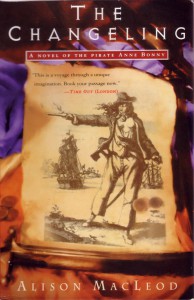The Changeling (Macmillan/Picador, 1996)

The Changeling
‘a magnificent debut novel…’ The Independent (2006)
‘Alison MacLeod has written a stunning novel. She has wrought characters who charm, beguile and refuse well-trodden paths. In her recreation of 18th-century Cork, Anne Bonny is the changeling, a rare babe who refuses swaddling. Her restless spirit remains untethered and her gender indeterminate… There is no romance in this vision of pirating. Rackham’s crew, bent on reaping the rewards of a ship’s hold — whether gold or African slaves — cut out tongues, nail a captain’s innards to the main mast and force a cabin boy to eat cockroaches. MacLeod has such a delicate eye for detail that these other-worldly scenes are brought shimmeringly to life… This is a wonderful tale, beautifully written and yet steeped in the myth that it deservedly explodes.’ NEW STATESMAN
‘The womanly wisdom, the old wives’ tales and the author’s sublimely sensual narrative ensure the book oozes with oestrogen. But it also honks of history, with an authenticity of language and geography that captures completely the unfolding landscape of the new world. Its breadth is vast, its structure flawless. This is a voyage through a unique imagination.’ TIME OUT (London)
‘MacLeod’s novel inhabits its period in more ways than one. In true 18th-century fashion, it readily admits of other voices. Rumours, reports and old wives’ tales, jostle the narrator for space; there are echoes of Defoe and Swift’s wild, satirical inventiveness. At the same time, nothing qualifies the author’s originality.’ THE INDEPENDENT
‘It’s very bold and very accomplished… She romanticises piracy in a way, but it’s always within a context — so you have the terrific violence and the pain of their wounds; you have terrific stories like them discovering an abandoned government schooner which is full of dying or half-dead negro slaves, and they’re just floating adrift in the sea, and there’s the slightly moral question of what do they do with these slaves – sell them, release them, kill them, what do they do with them? This is still legitimate piracy but it is within a context; i.e.,  these people have come from tremendous poverty where there is no choice, where they are victims of constantly changing circumstances and at least you have a high excitement as a pirate, your life has some element of self-control… your circumstances can change very, very quickly as Anne Bonny’s does, which is why she has to be dressed up as a boy. So… the story has a context; it isn’t a fairy tale…. it goes back to the writing. She’s a very accomplished writer and she manages to make these scenes come alive.’ BBC RADIO 4
these people have come from tremendous poverty where there is no choice, where they are victims of constantly changing circumstances and at least you have a high excitement as a pirate, your life has some element of self-control… your circumstances can change very, very quickly as Anne Bonny’s does, which is why she has to be dressed up as a boy. So… the story has a context; it isn’t a fairy tale…. it goes back to the writing. She’s a very accomplished writer and she manages to make these scenes come alive.’ BBC RADIO 4